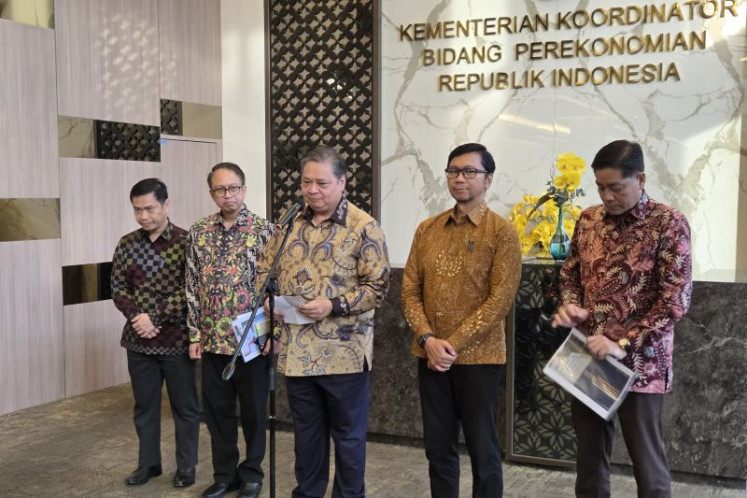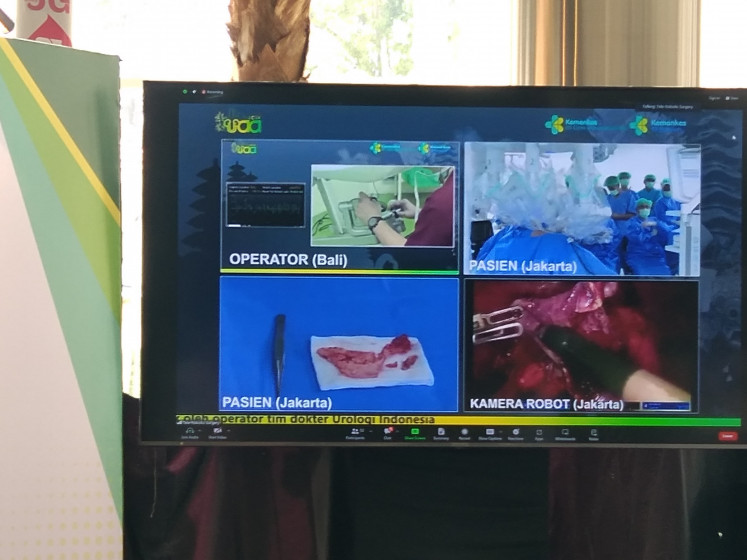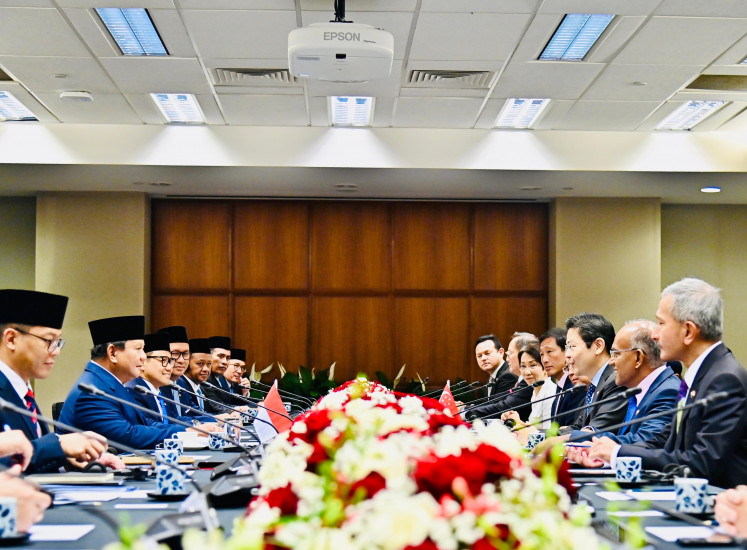Popular Reads
Top Results
Can't find what you're looking for?
View all search resultsPopular Reads
Top Results
Can't find what you're looking for?
View all search resultsBreaking down The taboo
Hidden gift: A student paints watercolor fruits as product designs
Change text size
Gift Premium Articles
to Anyone

H
span class="caption" style="width: 398px;">Hidden gift: A student paints watercolor fruits as product designs. The products, such as notepads and badges, are sold to teach students about financial independence. JP/Alexandra Hansen
Stares, avoidance and even nasty catcalls are often daily occurrences for those one in every 800 people born with Down syndrome.
Even though an estimated 300,000 Indonesians have Down syndrome, it is still largely taboo in Indonesia, and living with the genetic condition can be difficult for those who have it, and their families.
Chairperson of the Indonesian Down Syndrome Society (ISDI) and mother of a 19-year-old with Down syndrome, Aryanti Yacub, says having a child with this condition can be very difficult when there is a negative stigma attached to such a disability in Indonesia.
“You can feel the negativity on the street. People look differently at you, they try to stay away, in extreme cases they say nasty things, you can always sense the hostility.”
Down syndrome was discovered by British physician John Langdon Down in 1866, and while it was originally thought to be a symptom of inter-breeding in Mongol tribes, it is now known to be caused by the presence of an extra chromosome, chromosome-21.
The extra chromosome has many detrimental effects to the person with the syndrome from birth,
including a much lower than average cognitive function, difficulties in understanding and communicating coherent speech, high risk of congenital heart defects, and distinctive facial features including a very rounded face, and an oversized tongue.
People with the condition are also more likely to be overweight due to very poor muscle tone, and these distinctive features make them easy targets for people not educated about the disease.
Such disabilities can make life very difficult without the proper support, and it was for this reason, and the dream of a better life for her son that Aryanti formed ISDI with the aim of providing vital life lessons and support for those with Down syndrome.
ISDI was formed in 1999, and a life skills studio program was implemented in October. Aryanti says it started with a common need for support among parents of children with Down syndrome.
“It started with meetings and seminars of parents sharing their experiences, their advice, advice
on things like health and life in general.
“It made things so much easier. In those early days when the children were young, things were so much harder. We were ignorant about Down syndrome, we saw only darkness, and no future for our children. That has all changed now thanks to ISDI.”
The children attend the ISDI studio five days a week once they have graduated junior high school.
They learn basic life skills intended to make them more independent such as cooking, computer skills, and simple reading and writing.
They also learn how to be more confident and enjoy themselves with music and dance, and traditional Indonesian instruments such as the angklung.
A regular school syllabus, while often too fast-paced for students without disabilities, is virtually impossible for those with Down syndrome.
As Down syndrome causes cognitive functions to be much slower, people with the condition would be unable to keep up with the regular school system, adding more frustration and detriment to people living with the disability.

The ISDI centre does not aim to render its students capable of keeping up with a regular school syllabus, but rather to make students more confident, independent, and able to lead as normal a life as possible.
Aryanti also believes it is important each student has ambitions of its own and victories to be proud of.
“For some students, finishing their lunch on their own is a victory for the day, an important goal they have worked hard to achieve. For others with more ability, they are competing in the Special Olympics in Dublin.”
Two students have previously competed in Dublin games, and others have participated in PORCADA (regional games for the disabled), PORCANAS (National games for the disabled), and in fine arts competitions in Rome and Iran.
The organization also believes it is very important to teach the students to be charitable to other less-fortunate people. Many programs have been run through the center where the students assist in distributing food to the poor, and wheelchairs to the disabled.
Wawa Nashita, a volunteer at the center, has noticed a dramatic improvement in her son Eko since he joined the ISDI program.
“He was so different before. He would get angry and upset at his lack of communication skills and would hurt himself in his frustration. Now he is happy, he doesn’t get moody, and he is much more confident.”
The students are taken on excursions to places like banks and the supermarket, and taught how to count money as well as interact with people outside their family and school.
“To be independent, they need to know how to live life day-to-day,” Wawa said, “how to eat healthily, stay active, and remain positive.”
The school also attempts to teach them how to be financially independent, with the production of hand-painted watercolor notepads, badges and magnets, retailing for Rp 3,000 (30 US cents) to Rp 10,000.
The student’s families pay Rp 30,000 per day for food and other expenses, and extra for classes in art, dancing, and other subjects that require specialist teachers.
The school is privately funded in a trial program of one year, and the premises are on loan for two years.
Wawa said it is nerve-wracking knowing they don’t have a solid future, a monthly income or government support, and that they could lose their premises at any time.
“Ideally, the government could provide us with premises so we know we have a solid future. There is so much emphasis on the economy and other issues that disabilities take a back seat, it is all left on the parent’s shoulders.”
The center is a relatively new, one-room studio, displaying student’s achievements and paintings.
ISDI’s dream is to have a larger center, able to accommodate many more students than the current eight participating in daily classes.
“There are so many more parents out there with children with Down syndrome. Our wish is to be able to reach them all, and even if they can’t afford it, there would be a system in place providing [financial] assistance to enable them to come here and give a better life to their children.”
If anyone wishes to make a donation to ISDI or order watercolor notepads, badges, magnets, contact the society on (021) 725-5958.









